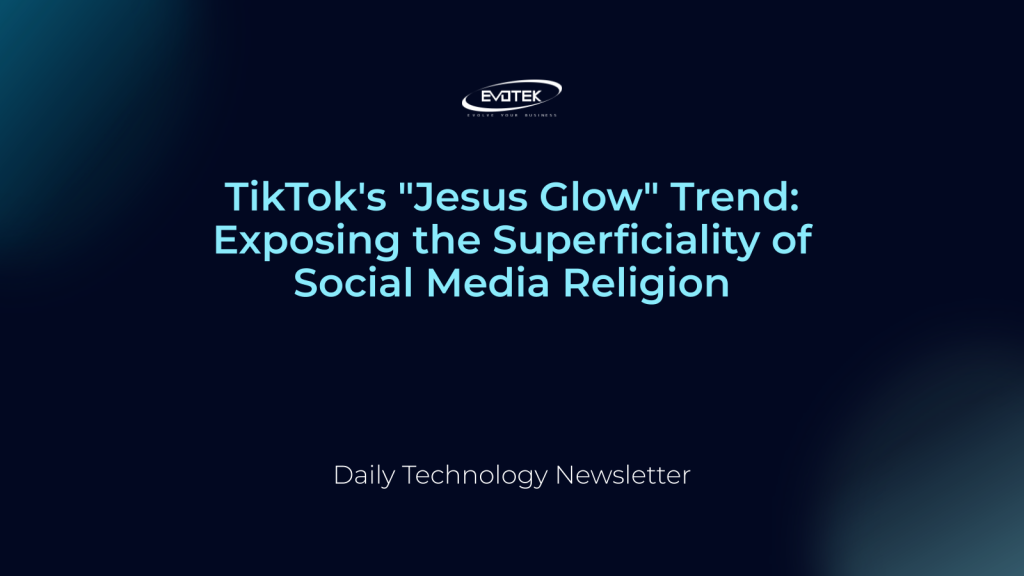Forget expensive skincare – a new trend has emerged on TikTok, where conservative Christian influencers are promoting faith as the ultimate beauty treatment. The “Jesus glow” trend features before-and-after videos showcasing supposed physical transformations after accepting Jesus Christ.
The “Jesus Glow” Phenomenon: More Than Meets the Eye?
These videos often depict individuals claiming to have transitioned from “misfits” to radiant beings, attributing their “Jesus glow” to their newfound faith. Examples include a former goth embracing a prairie dress aesthetic and a bodybuilder adopting a more petite figure with blonder hair.
Challenging the Narrative
A common theme in these videos involves preemptively addressing skepticism. The “before” image is typically accompanied by text questioning the existence of the “Jesus glow,” while the “after” image confidently asserts its reality. However, the supposed opposition to this “glow” often appears fabricated, leaving viewers to assume that unbelievers are being punished with outward ugliness.
A Closer Look at the Transformations
Upon closer inspection, these transformations often rely on clever lighting, filters, and changes in attire. As noted by Taylor Leigh and Drew McCoy of the Antibot YouTube channel, the “after” images don’t necessarily represent objective improvements in appearance but rather conformity to right-wing ideals of gender presentation, often with white supremacist undertones due to the emphasis on lighter hair.
The Narcissism of MAGA Christianity
The “Jesus glow” trend reflects a disturbing trend within MAGA Christianity, where self-improvement and the pursuit of envy are presented as the highest forms of holiness. This ethos contrasts sharply with the teachings of Jesus, who prioritized serving the poor and disabled.
This trend mirrors the approach of apps like Hallow, which downplay traditional Christian concerns about social justice in favor of a self-improvement focus akin to that of wellness influencers. It’s a superficial take on faith that prioritizes outward appearance over genuine spiritual growth.
The Allure of Online Christian Content
As traditional religious affiliation declines, younger generations are increasingly turning to online spaces for spiritual guidance. Pew Research indicates that younger Christians are more likely to follow religious leaders online, while Barna suggests a growing interest in Jesus among those who don’t identify as Christian.
The “Jesus glow” trend exemplifies the shallowness of much online Christian content, which often resembles self-help advice with a sprinkling of scripture. This approach can be seen in podcasts like “Girls Gone Bible,” which initially focuses on self-improvement topics before subtly promoting a far-right agenda.
The Dangers of Conformity and Victimization
The “Jesus glow” trend valorizes conformity and “traditional” gender roles while mirroring the victim mentality prevalent among Trump supporters. By framing faith as a rebuttal to imagined haters, these videos perpetuate a narrative of persecution and division.
The Real Cost of the “Jesus Glow”
While the “Jesus glow” is presented as a cost-free miracle beauty treatment, it ultimately comes with the expectation of aligning with MAGA politics. This trend highlights the insidious ways in which conservative Christianity is being marketed to young people, potentially leading them down a path of political polarization and superficial faith.
Ultimately, the “Jesus glow” is nothing more than a filter on a phone. True beauty lies in genuine faith, compassion, and service to others, not in conforming to narrow ideals of appearance.
By Amanda Marcotte
Amanda Marcotte is a senior politics writer at Salon and the author of “Troll Nation: How The Right Became Trump-Worshipping Monsters Set On Rat-F*cking Liberals, America, and Truth Itself.” Follow her on Bluesky @AmandaMarcotte and sign up for her biweekly politics newsletter, Standing Room Only.
Related Topics
- Christians
- Commentary
- Influencers
- Jesus Glow
- Tiktok
Related Articles
(Links to related articles would go here)
Copyright © 2025 Salon.com, LLC. Reproduction of material from any Salon pages without written permission is strictly prohibited. SALON ® is registered in the U.S. Patent and Trademark Office as a trademark of Salon.com, LLC. Associated Press articles: Copyright © 2016 The Associated Press. All rights reserved. This material may not be published, broadcast, rewritten or redistributed.

 日本語
日本語 한국어
한국어 Tiếng Việt
Tiếng Việt 简体中文
简体中文